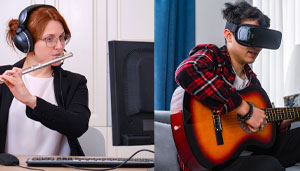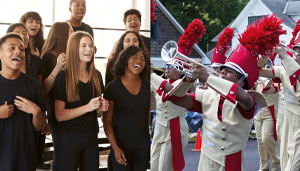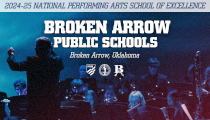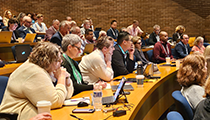United Sound: Putting Passion to Practice
By Lori Schwartz Reichl on December 12, 2022 music directors & adjudicators article PrintIn 2006, after a decade of serving as a secondary band director and mentor teacher in Arizona, Julie Duty left the classroom to raise her three children. Duty’s principal, Marti Farmer, reassured her decision by stating, “There will always be children to teach, but yours will only be small once.”
Fast forward to 2020, and Duty has gone from being “a stay-at-home mom with no connections at all,” to knowing many important people in the music industry within just a couple of years. How did she do it? With passion, persistence, and purpose.
Duty remains dedicated to music education and community service as an adjudicator, advocate, conductor, grant writer, performer, and volunteer. Additionally, she serves as a board member for Tempe Winds board of directors in Arizona, Music for All’s Advocacy in Action Committee, and the Institute for Composer Diversity’s Executive Council. However, she is most recognized as founder and executive director of United Sound, Inc., a nonprofit organization that collaborates with parents, educators, and school administrators to bring meaningful participation and inclusivity to the instrumental music classroom.
Using the question, “Who belongs in music?” the United Sound mission is “to provide musical performance experiences for students with special needs through peer mentorship.” United Sound is a school-based instrumental music club for individuals with intellectual or developmental disabilities and their peers. Dedicated to promoting social involvement through shared ensemble performance experience, United Sound joins students with and without disabilities to learn and perform in the band or orchestra together.
“When I was teaching, I wanted my classroom to be inclusive of all students, but once they were in the room, I found I had no skills to teach them and no materials were available to make it work,” she says. “When I stopped teaching in 2006 to be a full-time mom, I planned out United Sound, but put it aside knowing that it was too big for that season of my life.”
Later, when her youngest went to preschool, Duty started volunteering at a local children’s home where she worked on state paperwork, wrote grants, planned board meetings, and learned how a nonprofit organization worked. She acquired the skillset needed to manage her own organization. In December 2013, after attending the Midwest Clinic, Duty was inspired to bring her dream to reality.
In January 2014, Duty asked a local band director if she could test her ideas with his students. “We tested the peer mentoring structure by inviting 17 special education students to perform on all of the instruments,” she says. “Each child could play all of the instruments at some level. By April, we knew it worked.”
In August 2014, “United Sound” officially obtained nonprofit status (501c3). That fall, the organization inspired five schools, three bands, and two orchestras to include all students in their performing ensembles. Duty recalls, “I intentionally picked a high-income/high-music enrollment/competitive school, an urban/high free- and reduced-lunch-rate/low-music-enrollment school, and a rural/farming community, low-income but high-music-enrollment school so we would know if it worked in a variety of environments. It did.” This motivated Duty to expand the program.
Since 2014, United Sound has teamed-up with more than 145 school music programs providing opportunities for more than 2,000 New Musicians and 6,209 Peer Mentors who have performed together 775 times. With 145 chapters in 29 states, Duty admits, “No one, including me, thought it would grow this fast.” She believes teachers may have been challenged with inclusivity in the past due to a lack of training, lack of staff, and lack of curriculum and materials. By using a curriculum intended to be an out-of-the-box solution, the United Sound Method Book and Flash Cards use foods and colors to transform the abstract concepts of music.
With seven easy steps to follow, there are few limitations to beginning a United Sound Club in your school:
Step 1: Coordinate.
A music teacher and special education teacher should be identified and willing to collaborate. A typical club meets 30 times per year, 15 weeks each semester.
Step 2: Gather.
The Special Education teacher chooses the New Musicians best suited for participation. Peer Mentors are selected by the music teacher with a ratio of 3 to 1.
Step 3: Register.
Registration occurs through each child’s parent/guardian.
Step 4: Choose.
Each New Musician will select an instrument of choice and receive free specialized curriculum along with a United Sound Method Book.
Step 5: Train.
The special education teacher provides training to the Peer Mentors before and during club meetings. Both teachers will receive instruction from United Sound, and the special education teacher will be provided the necessary support (videos, worksheets, and more) to coach Peer Mentors.
Step 6: Begin.
The club is set up throughout the band or orchestra room with each group consisting of the New Musician learning to play their instrument and the three Peer Mentors teaching at an appropriate pace. The music and special education teachers will be present to guide and facilitate. By week 6, Peer Mentors will create modified parts of a selection from their band or orchestra repertoire for each New Musician. Based on aptitude, the modification may be as simple as a one- or two-note melody.
Step 7: Perform.
Following a full ensemble dress rehearsal, the New Musician performs a modified part with the ensemble at a live performance.
The benefits of United Sound have been tremendous. For the New Musicians, it has enhanced friendships, social connectedness, language and reasoning development, emotional development, spatial intelligence, increased coordination, self-confidence, and esteem. Duty says that “determining one’s passions and interests is a key learning component for students with disabilities.” United Sound provides an important avenue for this exploration.
The Peer Mentors benefit greatly from the experience by gaining an increased sense of social responsibility, exposure to diversity, communication and critical thinking skills, fine-tuned auditory skills, risk taking, team building, and an opportunity to apply academic learning to real human needs.
According to Duty, “Teachers use it to create culture within their music programs. Students learn deep leadership skills, and everyone is more bonded through the experience.”
Administrators mention that it has an impact on the school culture as a whole. “A basketball pep band that includes United Sound musicians brings the basketball game to an entirely different level. When young people have a place to go and a place to belong, that can change behavior problems and depression, as well,” Duty observes. The board members of United Sound declare, “We sincerely believe we are changing the face of music education.”
Composer Brian Balmages serves on United Sound’s National Advisory Board, and believes the relationships built in United Sound Clubs are a game changer. “United Sound doesn’t just exist to meet special needs,” he says. “It is here to meet human needs. The need to belong, feel safe, accepted, and more. And yes, this applies to both the United Sound musicians and their peer mentors.”
“As teachers, we’re often tasked with projects that take time, effort, and energy. United Sound is built to be small, simple, and sustainable,” Duty says. United Sound operates under the guiding principle of, “Many hands make light work.” Julie understands the stress placed on teachers and assures, “For a teacher, including just two students with significant disabilities can seem like a lot of extra work. But when you divide that work among numerous peer mentors, suddenly welcoming 10 new students into your program is completely manageable. We tell our teachers that they get one hour per week for United Sound with 15 minutes to get ready and 45 minutes to do it. If it’s taking you longer than that, you’re doing it wrong.”
By using this mentality, United Sound is able to sustain a 96 percent retention rate, because “the goal isn’t to include every child on the campus, but to keep including manageable numbers every single year,” Duty explains. With the average chapter size of eight New Musicians and 24 peer mentors, she points out that’s a tiny drop in the bucket of the 6.4 million special needs students in America’s public schools.
“When schools continue the club tradition, they make a huge dent in reducing the number of students who are excluded and ostracized in their own population,” she says. “What if we all included eight New Musicians? That said, it always makes a difference to the one.”
Duty has found where she belongs. “I love to work and create. I’m grateful that my own children have had an opportunity to serve through United Sound in their schools. Authentic service opportunities for teenagers are difficult to find.” By putting passion to practice, United Sound demonstrates NAfME’s mission “to advance music education by promoting the understanding and making of music by all.”
Lori Schwartz Reichl
This article first appeared in the April 2020 Teaching Music Magazine, published by the National Association for Music Education (NAfME). NAfME advocates for music education at the local, state, and national levels; provides resources for teachers, parents, and administrators; hosts professional development events; and offers a variety of opportunities for students and teachers. The Association has supported music educators at all teaching levels for more than a century. Visit https://nafme.org to learn more.
Most Recent Articles







